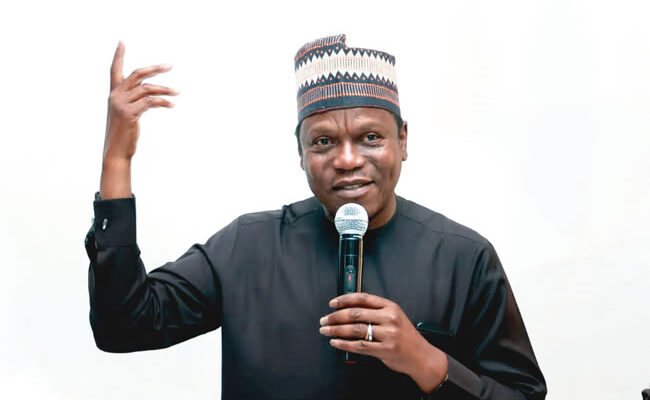

Recently at the Bureau of Public Service Reforms (BPSR) lunch time seminar, the Director-General, National Directorate of Employment (NDE), Mallam Abubakar Nuhu Fikpo, made a thought-provoking presentation on NDE’s road map in combating unemployment and promoting skill acquisition in Nigeria. CHRISTIAN APPOLOS brings details.
The NDE was established in 1986 to combat the swelling challenge of unemployment in Nigeria. Fast forward to 2023, the volume of the challenge for which the unemployment-combating agency was established has become a nightmare with alarming consequences that are prevalent in every nook and cranny of the country. And the question most people ask is, why is the NDE not the most equipped, relevant and well known agency of the Federal Government in the war against unemployment especially at this critical time?

Though the agency is doing so much silently, it is understood from the challenges listed by the NDE Director-General, Mallam Abubakar Nuhu Fikpo, at BPSR lunchtime seminar, that constraint in budgetary provision is among the top factors that limits the strength of the directorate in the all important fight against unemployment.
Also, on his way-forward list, aside from the apparent need to equip NDE with the 21st century necessaries to squarely face the unemployment challenge, the DG noted that certain factors must be considered and importantly put in place in order to achieve desired results in the effort to provide decent and sustainable jobs for the unemployed citizens.
They are aggressive campaigns for attitudinal change, re-orientation, social inclusion, de-radicalisation and re-integration of social deviants, establishment of National Employment Trust Fund, promotion of collaborative initiatives, strengthening of synergy among relevant MDAs.
The DG went on to say, “The NDE came into being in 1986 out of the need to combat the problem of mass unemployment which was on the increase due to certain prevalent socio-economic factors. These factors still subsist, thereby making the directorate to be more relevant than ever before. The NDE management therefore, stepped up innovative initiatives towards creating more employment opportunities for unemployed Nigerians.
“Nigeria recorded an unprecedented level of achievement in the effort to combat mass unemployment and poverty among different categories of the unemployed, especially, women, youths at risk and other vulnerable groups. These efforts have translated into the creation of millions of skilled labour; nano, micro and small enterprise in both rural and urban communities in the formal and informal sectors of the economy, thereby, absorbing and engaging unemployed youth and women in decent employment.”
Mallam Fikpo, while outlining the efforts of the President Muhammadu Buhari administration towards employment creation, said, “Under the current regime of President Muhammadu Buhari, a substantive fund was invested immediately after the COVID 19 pandemic. For the first time in Nigeria, a deliberate and conscious commitment was made in implementation of a strategy that cushioned and mitigated the effects of the pandemic through various palliative measures which includes the 774,000 job (ESPW), conditional and non-conditional cash transfers, etc.
“The president has graciously approved the allocation, with corresponding funds for completion of a mighty seven-storey building with basement to NDE as its permanent corporate headquarters. The building was one of the seized properties from corrupt persons by the Economic and Financial Crime Commission (EFCC) located at a choice area in Gudu District, FCT, Abuja.
“This is a sure journey towards the realisation of President Muhammadu Buhari’s desire to lift Nigerians out of poverty, which the directorate already keyed into in order to guarantee sustainable employment and wealth creation opportunities for the growing number of unemployed Nigerians.”
Mallam Fikpo gave explanation on how NDE is developing its job creation schemes and programmes, as well as structurally executing them considering the realities of the resources at its disposal for the herculean task.
“In designing the employment creation programmes, the National Directorate of Employment takes cognisance of the following factors: the declining interest of youths in the agricultural sector which had traditionally provided the bulk of employment, particularly in the rural areas and the deteriorating condition of urban and rural infrastructure due to the dearth of foreign exchange earnings to procure and maintain construction machinery and equipment as against the surplus labour (unemployed hands) available in the country.
“The expectations of graduates’ of tertiary institutions for non-existent white-collar jobs while their backgrounds do not prepare them to take advantage of the opportunities for self-employment in the formal and informal sectors of the economy; the potential of the informal sector and the traditional apprenticeship system of skills acquisition to generate self-employment; the need to counsel the unemployed for attitudinal reorientation towards embracing self-employment and self-reliance as against white collar jobs and the directorate’s weak funding and its implication in addressing the dynamic challenges of unemployment among Nigerians, calls for collaborative initiatives with relevant stakeholders,” he said.
Mallam Fikpo added, “In recognition of the foregoing factors, the programmes and schemes seek to empower beneficiaries with skills that have high employment potential using the following strategies: registration of interested persons, guidance and counseling, life skills training, hands-on training, entrepreneurship development training, business start-up/resettlement, mentorship, deradicalisation, monitoring and evaluation (M&E), tracer study and impact assessment.
“The programmes/schemes of the directorate are targeted at all unemployed persons which include youths and women, graduates of tertiary institutions, school leavers, school dropouts, persons with special needs and older persons/retirees.
“The under listed interventions provide the target group with the following: practically oriented skills acquisition, theory and learning for maximum skills and competencies development, result oriented exposure (based on set targets), participatory experience, demand driven skills, market focused and economically viable skills, people centred innovations (based on individuals’ inherent potentials.
“Over the years, the NDE established the following training facilities where unemployed youths acquire skills of different categories: vocational skills acquisition centres, agricultural skills training centres, common facility centres, agricultural parks, mobile training workshops, traditional apprenticeship system (through the informal sector).”
He also listed basic vocational and technical skills acquisition schemes through which the directorate creates employment. They are; Basic National Open Apprenticeship Scheme (B-NOAS), Advanced National Open Apprenticeship Scheme (A-NOAS), School-on-wheels (SOW), Community Based Training Scheme [CBTS]. Quick-fix Training, Technocultural Crafts Training Scheme (TECRATS), Lady Chauffeur Training Scheme (LCTS), School-to-work Training Scheme (S2Work), Partnership in Skills Training (PIST), Special Training for Persons With Special Needs (vulnerable groups), Resettlement Loan Scheme (RLS) and mentoring.
“Sustainable employment creation through agricultural skills acquisition schemes include Rural Agricultural Development Training Scheme (RADTS), Commercial Farmers Training Project (CFTP), Post Rural Agricultural Development Training Scheme (POSTRADTS), Off-Season Agricultural Production Training Scheme (OSAPTS), Sustainable Agricultural Development Training Scheme (SADTS), Agricultural Extension Training Scheme (AETS), Post Sustainable Agricultural, Development Training Scheme (POSTSADTS), Small Stock (goat) Production Training Scheme, Agricultural Value Chain Scheme (AVCS), Food Processing and Packaging Scheme (FPPS), Agricultural Enhancement Scheme (AES).”
According to him, there is also small and medium enterprise, management and development scheme known as “Start Your Own Business (SYOB), Basic Business Training (BBT), NDE-enterprise and finance counselling clinic (NDEefcc), Matured People Programme (MPP), Preparation, Processing and Packaging Training Scheme (PPPTS), Graduate Enterprise Attachment Scheme (GEAS), Micro Enterprise Enhancement Scheme (MEES), Women Employment Promotion, Enterprise Creation Fund/Job Creation for Young Entrepreneurs, Common Facility Centres (CFC), Entrepreneurship Development Programme (EDP) Sensitisation with NYSC.
Recall that the Minister of State of Labour and Employment ministry, Mr Festus Keyamo, recently said that NDE is the hub of blue collar jobs in Nigeria. And with the well structured job provision programmes and schemes the agency has developed, it should be equipped to maximally provide more blue collar job opportunities to the teeming unemployed Nigerians.
READ ALSO FROM NIGERIAN TRIBUNE








